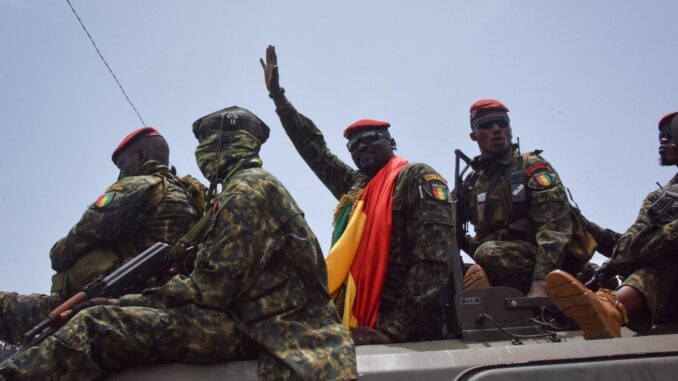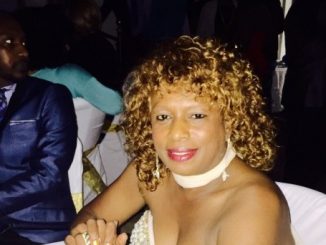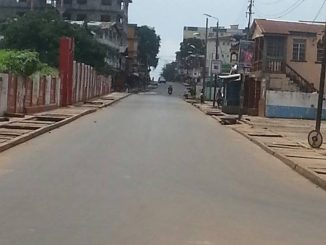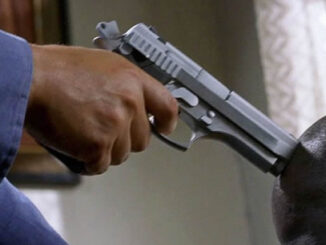
President Alpha Condé of Guinea has been overthrown by a coup that has been condemned by the international community but welcomed by the leader of the country’s opposition as a victory of the people over a dictatorial regime. Paule Fax and Charles Dietz report.
Early in the morning of Sunday 5 September, heavy gunfire from automatic weapons rang out in the centre of Conakry, the capital of Guinea, around the presidential palace where the head of state, President Alpha Condé, was located.
In the afternoon, Lieutenant-Colonel Mamady Doumbouya, who is seen as the leader of the coup, appeared on a video circulating on social media. He said his men had detained the president. “We have decided, after seeing the president who is with us, to dissolve the current constitution, to dissolve the government, and to close the land and air borders,” he said.
Speaking the following day, he said the coup was justified because of corruption, economic mismanagement and disregard of citizens’ rights under Condé. “The Guinean personalisation of political life is over. We will no longer entrust politics to one man, we will entrust it to the people.”
He also quoted from the late Jerry Rawlings, who led two military takeovers in Ghana: “If the people are crushed by their elites, it is up to the army to give the people their freedom.”
He said that the government had been disbanded but that a new government of national unity would be formed within weeks and promised there would be no “witch-hunt” against former officials.
Opposition leader Cellou Dalein Diallo welcomed the coup, saying the it was a “victory of our people and the failure of the dictatorial regime” and a historic act that completed the work begun by pro-democracy groups. News of the coup was greeted by widespread celebration in the streets of the capital.
Celebrations are still ongoing in many parts of Guinea’s capital Conakry as it starts to sink that Alpha Conde has been ousted. #GuineaCoup #Conakry pic.twitter.com/lF3TL3gfEZ— Baillor Jalloh (@baillorjah) September 5, 2021
Why was Condé overthrown?
Guinea is a West African country with a population of around 12.5m. Mining accounts for about half of its GDP, which was estimated at $26.5bn in 2020. The country has important deposits of bauxite, diamonds, iron ore and gold, but development of projects with the potential to transform the country’s economy such as Simandou have been stymied for decades by alleged corruption, lack of infrastructure and legal disputes.
It declared independence from France in 1958 under under the leadership of Ahmed Sékou Touré, rejecting the former colonial power’s plans for it to gain more autonomy in a new association of French colonies. The manner of French withdrawal has been described as brutal, with departing colonists taking with them everything they could, even removing lightbulbs.
Unlike France’s other former West African colonies, the country abandoned the CFA franc, and over the following decades under Touré’s rule pursued socialist and pan-Africanist policies. Relations with France improved under his successor, Lansana Conté, who moved the country away from socialism, but Guinea underwent periods of military rule and dissent was often repressed.
Condé was first elected President in 2010 after spending decades in opposition – he had even been condemned to death under Touré for his activities. A professor of human rights, he came in with promises of democratic reform and ethnic reconciliation, but his rule soon became associated with corruption and economic mismanagement.
“Alpha Conde is one of the politicians who worked over 40 years for democracy in Guinea. Once in power, he totally destroyed it,” human rights expert Alioune Tine told Reuters. “He put people in prison. He killed and he completely refused any political dialogue with the opposition.”
The country suffered mass civil unrest in 2019-20 in protest against Condé’s rule and his wish to change the constitution to allow him to run for a third term in office.
Condé was elected for a third time in October 2020, following acceptance of the proposal in a March 2020 referendum, but the opposition rejected the result alleging fraud and protests broke out again all over the country. The pan-African research institution Afrobarometer has reported that Guineans strongly prefer democracy to any other regime but want the presidency to be limited to two terms.
President of Guinea Conakry Alpha Condé after he was captured by army putschists during a coup d’état in Conakry on September 5 2021. (Photo: MILITARY SOURCE / AFP)
Who is Doumbouya?
According to Radio France Internationale (RFI), Doumbouya first came to public attention in 2018, when he took part in the independence day parade at the head of his new special forces unit, in red beret and sunglasses. His hooded men made a strong impression.
The official mission of the Special Forces Group (GFS) is to fight terrorism. But according to Aliou Barry, a specialist in military issues in Guinea, the head of state wanted to make these better armed and equipped soldiers “a unit in his pay to suppress protests” in the country.
Doumbouya, a Malinké from the Kankan region, was serving in the French Foreign Legion when he was recalled to Guinea to command the GFS. A spokesperson for the Ministry of Defence described him at the time as “a colossus with an impressive physique”.
He has undertaken elite military training in France, Israel, Senegal and Gabon, and has served in Afghanistan, Côte d’Ivoire and the Central African Republic.
A man of ambition, he aroused the suspicion of the authorities. For several months, rumours had circulated about his possible arrest. Barry says that he was suspected of having contact with Colonel Assimi Goïta, who carried out the coup d’état in Mali last year.
On Twitter, @CalvinMutsinzi has drawn attention to Doumbouya’s connections with the US Africa Command, while others have stressed his connections to France as a former member of the Foreign Legion.
That man in the middle is Col Mamadi Doumbouya in a picture with #UnitedStates US-Africa Command.
Do you read what I am reading?#Guineeconakry #GuineaCoup
pic.twitter.com/B4R4F3SBKD— Calvin Mutsinzi (@CalvinMutsinzi) September 5, 2021
Coup condemned
On Sunday, the President of the Democratic Republic of Congo, Félix Tshisekedi, also current President of the African Union (AU), and Moussa Faki Mahamat, President of the AU Commission, condemned “any seizure of power by force” and demanded the immediate release of President Condé”, calling for an emergency meeting of the AU.
For his part, the Ghanaian head of state President Nana Akufo-Addo, current President of the Economic Community of West African States (ECOWAS), demanded “respect for physical integrity” of President Alpha Condé, his immediate release and “a return to constitutional order under penalty of sanctions”.
Washington, Brussels and Paris have also condemned the coup. France has said it is joining the call for “the immediate and unconditional release of President Condé”. The same goes for the EU’s head of diplomacy, Josep Borrell, who called on all actors to “act with respect for the rule of law, the interests of peace and for the well-being of Guinean population ”. In a statement, the US State Department said the violence and extra-constitutional measures would only erode Guinea’s prospects for peace, stability and prosperity.
Former US special envoy to the Sahel, J. Peter Pham, said “Whatever the justification given, an extra-constitutional regime change is always destabilising for a country, and bad for the economy”.
The coup represents the third takeover of power by the military in West Africa in the last year, after recent coups in Mali and Chad.
Speaking to the Financial Times, Idayat Hassan, head of the Abuja-based Centre for Democracy and Development, said that the coup is part of “a pattern fast emerging in the region . . . linked to elections . . . and a ruling class who rules without the interest of her citizens at heart . . . It is telling that citizens [would] support a coup d’état.”




